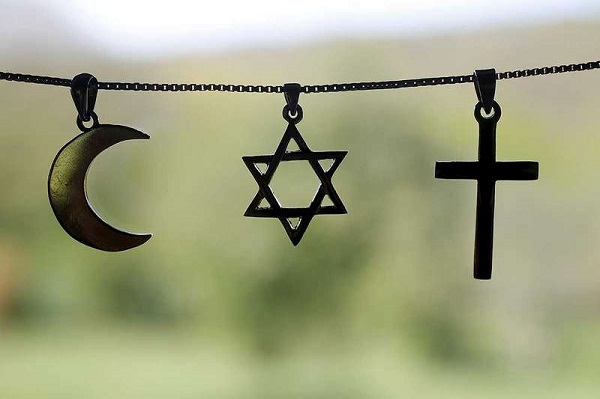
Over Easter, apart from wondering Where is heaven? I read an article in the New Scientist Is religion good or bad for humanity? Epic analysis delivers an answer
- A scientific review of 10,000 years of history is finally revealing the unexpected truth behind religion’s role in human civilisation
The author is Harvey Whitehouse, who is chair of social anthropology and director of the Centre for the Study of Social Cohesion at the University of Oxford. Back in 2015 I took a look at Karen Armstrong, ‘the myth of religious violence’ and the secular state. Whitehouse claims his investigation is ‘scientific’. It is certainly impressive.
- In 2010, Pieter François at the University of Oxford, Peter Turchin at the University of Connecticut and I began building a history databank. This project, named Seshat after the Egyptian goddess of record-keeping, provides us with the infrastructure and data to investigate these hypotheses rigorously and on a global scale. To date, it contains information on more than 400 societies that have existed around the world over the past 10,000 years. Seshat keeps growing, but we believe it is now mature enough to tackle the question of whether religion has been good or bad for humanity.
He says that a study of 60 societies, ranging from small groups to the very largest, found that people everywhere equate “good” with cooperative behaviours and “bad” with non-cooperative ones. These societies ranged from egalitarian to authoritarian, giving rise to a more tangible question about religion:
- what role, if any, has it played in establishing the cooperative behaviours that have allowed human societies to grow from small hunter-gatherer groups to vast empires and nation states?
Religion is often thought of as the social glue that binds societies larger than the band or tribe together, enabling broader cooperation.
- One obvious place to begin is the Axial Age, a period when many researchers believe civilisation pivoted towards modernity. Around the middle of the first millennium BC, the thinking goes, a set of cultural changes swept the world. Novel notions of equality radically altered the relationship between rulers and ruled, stabilising societies and allowing them to take a leap in size and complexity. Religion is thought to have played a role.
The Axial Age concept captures the emergence of a handful of important prophets and spiritual leaders – including Buddha, Confucius and Zoroaster, who rose to prominence in that period, preaching similar moralistic ideologies.
This period is also associated with the emergence of:
- “Big Gods”: deities who demand that their moral code be observed by all, and who have supernatural powers of surveillance and enforcement. Most of today’s world religions have these moralising gods, but they are rare in small-scale societies, where supernatural beings tend to care only whether people discharge their obligations to the spirit world.
Whitaker uses the verb “invent”. In other words, humans made the gods, not the other way around.
Whitaker says a number of researchers have examined how sacred rituals may have acted as social glue:
- For most of prehistory, humans lived in small groups whose members all knew each other. Today’s small-scale societies tend to favour infrequent but traumatic rituals that promote intense social cohesion – the kind that is necessary if people are to risk life and limb hunting dangerous animals together. An example would be the agonising initiation rites still carried out in the Sepik region of Papua New Guinea, involving extensive scarification of the body to resemble the skin of a crocodile, a locally revered species.
He says that when farming developed people did not depend on each other as much and didn’t require the same levels of social cohesion. Rituals changed. The new pattern was that rituals were practiced more frequently and were less drastic:
- These were generally painless practices like prayer and meeting in holy places that could be performed frequently and collectively, allowing them to be duplicated across entire states or empires.
But:
- A puzzle, however, is that many of these early civilisations also practised the brutal ritual of human sacrifice. This reached its zenith in the so-called archaic states that existed between about 3000 BC and 1000 BC, and were among the cruellest and most unequal societies ever. In some parts of the globe, human sacrifice persisted until relatively recently.
This practice persisted with the Incas, where their rulers had divine status and were highly authoritarian.
More recently Whitaker participated in a larger study that looked at what happened in the Axial period, where they measured social complexity with 51 markers, including population size. They found that instead of helping foster cooperation as societies expanded, Big Gods appeared only after a society had passed a threshold in complexity corresponding to a population of around a million people, and much later than expected.
They found that it was the shift in the nature of rituals from traumatic and rare to painless and repetitive, which came with agriculture and populations growing beyond 100,000, which allowed larger states to develop. This move from traumatic and rare to painless and repetitive predated Big Gods in nine of the 12 regions they studied, by 1100 years, on average. Those big moralising gods give rise to the first doctrinal religions, the forerunners of today’s world religions.
However, there was a dark side to this development – human sacrifice re-appeared. So human sacrifice, which was a feature of what they call ‘archaic states’ of less than 100,000 people, gave way to agriculture and a more benign form of rituals. These states had a tendency to break up, become internally unstable and subject to invasion. However, they grew, stabilised and became rule-based without the entry of Big moralising Gods, who then brought with them a return to human sacrifice.
The first Big God happened in Egypt:
- where people believed in the supernatural enforcement of order or Maat – personified by a goddess – as early as 2800 BC. Egypt had a population of some 1.1 million at the time and was, by all measures, the most sophisticated society in the world.
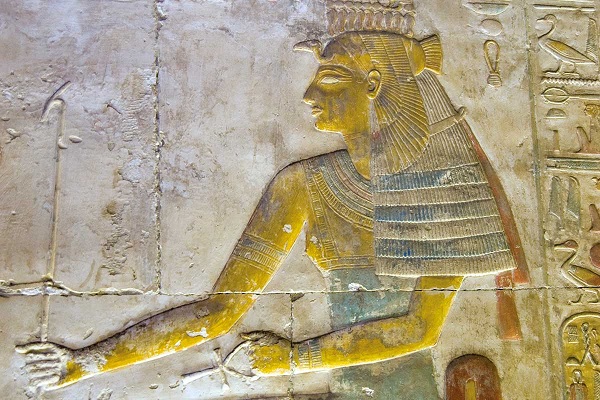
Whitaker speaks of Buddhism and Confucianism as religions. Buddhism certainly has an approach to the nature of being and reality, but I would characterise it as a philosophy rather a religion. Perhaps the rituals qualify it. I don’t know much about Buddhism, but I understand that in Buddha’s time they did not have a concept equivalent to ‘meditation’, which is a Western construct.
I thought Confucianism was mainly about ethics, which would not qualify it as a religion in my thinking.
I would also like to hear what he thinks about Indian religions, where they seem to have retained many gods, but life is said to be more infused with religion than most other places.
As to religion being good or bad, I don’t want to add much to what I said in the post Karen Armstrong, ‘the myth of religious violence’ and the secular state.
One instance of religion being good or bad might be the Council of Clermont where in 1095 Pope Urban II effectively kicked off the First Crusade by calling all Christians in Europe to war against Muslims in order to reclaim the Holy Land, with a cry of “Deus vult!” or “God wills it!”. While he was at it he gave absolution in advance to those who killed anyone.
Four years later, in 1099, we had the Massacre of Jerusalem, not the first of last massacre associated with religion, but one of the worst which probably resonates to this day.
Later in 1631 during the Thirty Years War we had the sacking of Magdeburg, which went badly out of control. Wikipedia says 5,000 survived out of a population of 25,000. Christopher Clark (in his history of Prussia) puts the pre-siege population at 35,000. The siege lasted years. The Imperial troops, many of them mercenaries, lived off the land, which had been smashed by armies moving back and forth. During the Thirty Years War Brandenburg lost half its population.
After Magdeburg fell there was nothing to eat or loot, so after the usual raping the troops started killing – everyone. Once they started there seems no reason to stop, so they didn’t.
- Pope Urban VIII expressed his satisfaction that “the nest of heretics” was destroyed.
I was raised a Lutheran. Incidentally, Martin Luther never left the Catholic Church, just developed views that were incompatible. Among these is that every one of us stands before God separately and individually, without the enabling role of priests or the church. We just have to accept our sinful nature and seek forgiveness. But faith alone, not works, was required. Nevertheless our mentors were quick to point out that if our faith meant anything, and we really wanted to do God’s will, then good behaviour would surely follow.
This path became increasingly tortuous during my teenage years, and I recall at age 16 on a Lutheran Youth Camp at Coolum on the Sunny Coast asking some theologians questions they reckoned they’d never been asked before.
The split came in second year university, when I could not find faith within me, and refused to take the ‘leap of faith’. I reasoned that if God wanted me he (always “he” for me, probably where I went wrong!) knew where to find me. I found black holes and the principles of quantum physics, which lead me to think there is indeed reality beyond what has been revealed to our senses, but knowing that reality seems incompatible with being who and where we are.
Any way, I reckon there was a small step from where Luther stood to recognising every individual as having equal worth and the right to a dignified existence by virtue of being human. But Luther was a conservative person, beholden for personal safety to princes. Nevertheless he thought everyone should read the Bible for themselves, a radical idea at the time, so he translated it into German with the New Testament appearing in 1522, followed by the complete Bible, containing the Old and New Testaments with Apocrypha, in 1534.
This article How Luther gave Germans a language everyone could use tells how Luther pitched the language between ‘low’ and high’ German, giving it life through adopting phrases used by the common people. Ironically, the Catholics, who had thought German too coarse to use for the Bible, had to use Luther’s language to counter him and to bring out their own version of the Bible. It probably helped that Luther grew up in Mansfeld and entered the monastery in nearby Erfurt, which is quite centrally placed:

His contribution was more than a translation of the Bible and the creation and consolidation of a unified German language. This Wikipedia article has a real rave:
- So translation of the Bible would allow the common people to become aware of the issues at hand and develop an informed opinion.[41] The common individual would thus be given the right to have a mind, spirit and opinion, to exist not as an economic functionary but as subject to complex and conflicting aspirations and motives. In this sense, Luther’s vernacular Bible acted as a force towards the liberation of the German people. The combination of Luther’s social teachings and the vernacular Bible undoubtedly had a role in the slow emancipation of western European society from a long phase of clerical domination.[42] Luther gave men a new vision of perhaps the exaltation of the human self.
As a brief aside, here is the castle where Luther was holed up when he translated the Bible (from our 2015 trip):
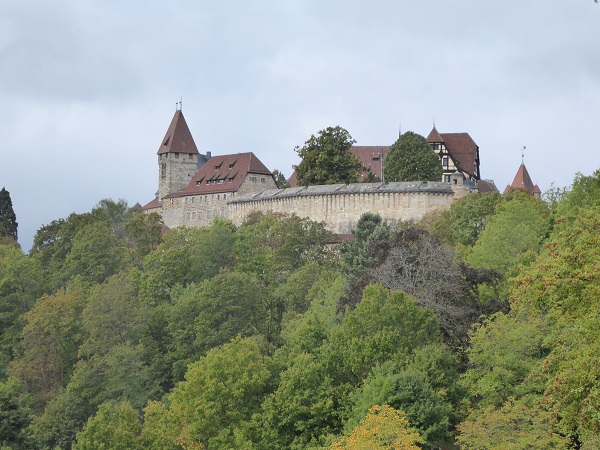
Here is the desk where he sat:

Nearby is an ornate internal pillar:
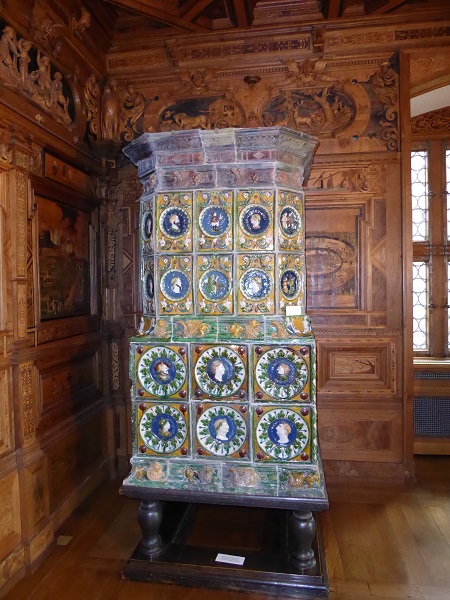
Here’s a detail showing how one of the locals kept warm in the winter back then before central heating:
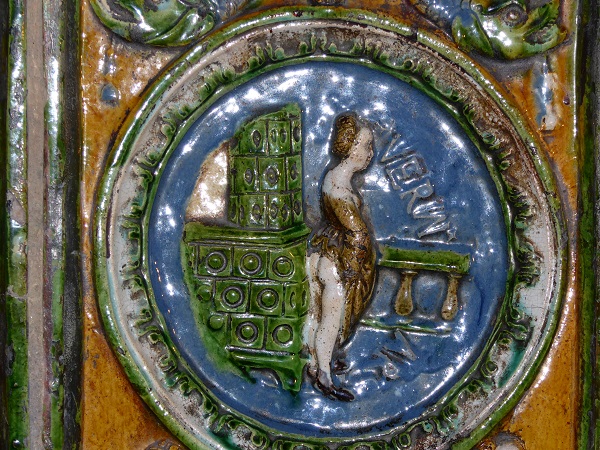
This attitude to universal literacy showed through in Prussia adopting compulsory schooling in 1762, more than a century before England, where they were more inclined to export their illiterates than to educate them.
I’ve been indulging myself, but the above shows how broad and deep you have top look to answer what might be seen as a simple question.
The Catholic Counter-Reformation, the Inquisition, and the Jesuit emphasis on reason and the reform of the individual demonstrated good and bad. Catholic social justice has done much good in the world, and is said to influence some of the democratic voting systems in Europe.
Our younger son went to a Christian Brothers school, which “strive to offer a liberating education, based on a gospel spirituality, within an inclusive community committed to justice and solidarity.” It was an excellent school, where the informal curriculum was devoted to personal development aiming to prepare kids to transact personally in the world as 18 year-olds when the leave school. This part of the school’s program was taken as seriously as the formal curriculum.
The Royal Commission into Institutional Responses to Child Sexual Abuse was thorough, and many church institutions were found guilty of egregious harm. Trust will be difficult to rebuild.
I’d have to say that my son’s school did not figure, nor did the Lutheran boarding school I went to, nor any other Lutheran institution as far as I heard.
There is a difference between religion, and institutions, of course, which are run by humans known to sin from time to time.
As to the question, Is religion good or bad for us? the answer is clearly both, but the balance varies with time place and circumstance. I guess the bottom line is that there is no opportunity to demonstrate goodness or merit unless there is the freedom to act otherwise. There is also room for disagreement in what constitutes ‘the good’. However, there is also scope for agreement about universals. Whitaker nominates co-operation. I would certainly add compassion and, in general terms, the Golden Rule.
I did read once that every society has a concept of justified killing of a fellow human, as well as a concept of unjustified killing.
Some thoughts to ponder.

I would say both and necessary.
Although I’m not “ religious “, my concept of good and bad is founded in some religious cultures.
It’s a question of Who Made Who ( shout out to AC/DC ) ultimately.
There’s both good and bad in everything and everyone every day, and that varies in proportion depending on the subjectivity of the individual judging.
That’s where I am on that at this point anyhow.
Brian: I you consider the effect of Luther’s teaching you can focus on some of the positives this teaching had over time. Think of all the people who were killed as a result of this teaching and all the people who have benefited over time.
Brian: Before you can answer the question you need to work out what you mean by “religion”. For most people mean something that relates to what they have learned their religion is all about.
Had an interesting conversation with a EU type about what was a religion. I argued that cricket as it was in the sixties could be considered a religion because it had moral values, ways of doing things and sacred heroes like Bradman who were worshiped by the followers of cricket.
For some odd reason the EU man wouldn’t accept this. He wanted to define religion as what you believed when you are on your death bed. (On reflection – Hardly surprising for a religion whose marketing is based on what you have to do to be saved and go to heaven when you die.)
The Davidson’s experience with traditional Aboriginal society convinced us that Aboriginal society as we experienced it was very, very foreign and that it is a bit risky labeling parts of their customs and way of doing things as “religion”, “customs” and
“laws.”
Perhaps you should re-frame your question in terms of culture and politics rather than religion?
Looking at community culture we might identify things that might help individuals, families and the community to function better but may have a price that disadvantages some people etc. and may dangerously poison relationships with “outsiders.”
John, if I were asking the question for myself and posting about it, I would attempt a definition. The points you make are valid and very interesting.
My purpose was to share the ideas as they appeared in the article, and then I got carried away a bit.
I’m satisfied with Dictionary.com’s definition:
And John, I agree with Brian – the points you raise are valid and very interesting. I particularly value your experience of remote communities.
John, on your point about Luther and the people who got killed, I don’t think you can attribute that to Luther as such.
The big problem goes back to around the beginning of the Common Era when apart from the Romans, most of the continent above The Alps was populated by Celts and then Slavs. The German language developed around 500-0 BCE in the Nordic Bronze Era area, roughly now Denmark and Sweden. Then they came south, disrupting Europe. I’ll just mention the Franks, the Goths, the Visigoths, the Lombards, the Alsatians, the Burgundians, the Normans, as well as the Angles, Saxons and Jutes. Probably missed some.
From the 5th century we had the Frankish Empire develop, which you can see in this map:
When Charlemagne (Charles the Great) died he split the empire between his three sons. The western part became France, the middle bit disappeared, and the rest splintered into bits under the hegemony of the Holy Roman Empire, later Holy Roman Empire of the German Nation, which was thoroughly entangled with the Papacy, with Austria the hegemonic power.
Luther had broken away, but so did Henry VIII and Calvin outside the HRE.
The Thirty Years War was horrible, with parts of Germany reducing population by up to 75%. It started with the defenestration of a couple of Imperial representatives in the castle in Prague by some revolting Calvinists. The Lutherans had a deal under the Peace of Augsburg, so the Lutheran principalities could practice their faith, but the Calvinists didn’t.
However, the German problem if anything got worse after that, and by the end of the 18th century by some counts there were 1800 political entities in the Holy Roman Empire. Here’s a map meant to represent 1789:
Napoleon tidied it up, with more enormous bloodshed, and Bismarck created a German Empire (it had four kings from memory) in 1871, but arguably the German problem was not settled until after two world wars in 1989 when the Berlin wall came down.
Continental Europeans value peace in ways the Americans find hard to understand.
One way or another there was murder and mayhem in Europe from Roman times on, no doubt some of it caused by religion, but I wouldn’t particularly finger Luther.
That’s all a bit rough. I should do a post one day.
As a school lad, “defenestration” was one of my favourite words.
And it’s certainly a technique that can’t possibly fall foul of those ridiculous human beings who want to restrict the rights of their fellow primates to own metallic objects (guns) which were clearly fashioned for entirely defensive purposes.
Ah, defenestration.
Give me a window and I can make a real difference to someone’s life!
Ambi et fenestra
Ambi: Me I thought defenestration had something to do with the appalling practice of removing beards. Learn something every day. I guess the good news is that the pain of being thrown out of a third story window doesn’t last as long as having your beard pulled out
Rest easy, Oh Bearded One.
Peace be upon you and upon your mighty beard.
Rev Ambi.
John D
Were you getting defenestration mixed up with
de-fungous-tration? [removal of a beard, hair by hair]
(Or removal of a petroleum-based vehicle, known as
car-stration?)
Ambi: Good to see at least someone respects the mightiness of a good beard. However I miss the good old days when all you needed to do to be recognized as a radical was to have a short beard and point out that people can’t prove that god exists or doesn’t exist (I must admit that having walking about in bare feet doing things aimed at improving the lot of Aborigines and other oppressed people added to the reputation.)
Our missives have crossed, oh Bearded One.
(Then there was the ending of Postwar rationing, termed – if I recall correctly –
de-ration-ration)
Doubting the existence of God???